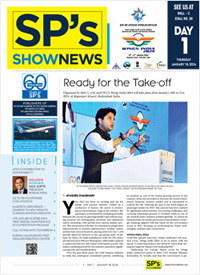- Prime Minister Narendra Modi inaugurates Aero India 2023 in Bengaluru; Releases Commemorative Stamp
- Defence Secretary meets delegations from Saudi Arabia, USA and Oman on the sidelines of Aero India 2023
- Foreign Ministers of 32 countries to attend Aero India 2023
- Embraer showcases the C-390 Millennium at Aero India 2023
L3 awarded contract to support Boeing's MQ-25 unmanned tanker for the US Navy
Contract for surveillance, traffic collision and avoidance, and recorders supports the US Navy's first unmanned aerial refueling program
L3 Commercial Aviation has been awarded a contract by The Boeing Company to supply ADS-B surveillance, collision avoidance technology and flight data recorders for the MQ-25 unmanned aerial refueling program.
"L3 has a long history as a supplier on the Boeing tanker platforms," said Terry Flaishans, President of L3's Avionics division. "As they continue to make history with the first unmanned tanker, we are proud to supply the next-generation surveillance and flight data recorder solutions."
As part of this contract, ACSS (an L3 and Thales joint venture) will be supplying next-generation, enhanced ADS-B and collision avoidance technology that provides precise information about surrounding air traffic. As one of the first Traffic Collision and Avoidance Systems (TCAS) and ADS-B providers, it has been supplying the commercial and military aviation markets with advanced safety, communication, surveillance and antenna products for nearly 20 years, with over 75,000 units fielded.
L3 will also be supplying the flight data recorder, which is the smallest, lightest recorder available for military aircraft and uses the latest in recording technology.
The MQ-25 is the US Navy's first operational carrier-based unmanned aircraft and is designed to provide a much-needed refueling capability. The contract supports Boeing's engineering and manufacturing development program to provide four MQ-25 aircraft to the US Navy for Initial Operational Capability by 2024.
"The MQ-25 program is vital because it will help the US Navy extend the range of the carrier air wing, and Boeing and our industry team are all-in on delivering this capability," said Dave Bujold, Boeing's MQ-25 Program Director. "The work we're doing is also foundational for the future of Boeing – where we're building autonomous systems from seabed to space."





